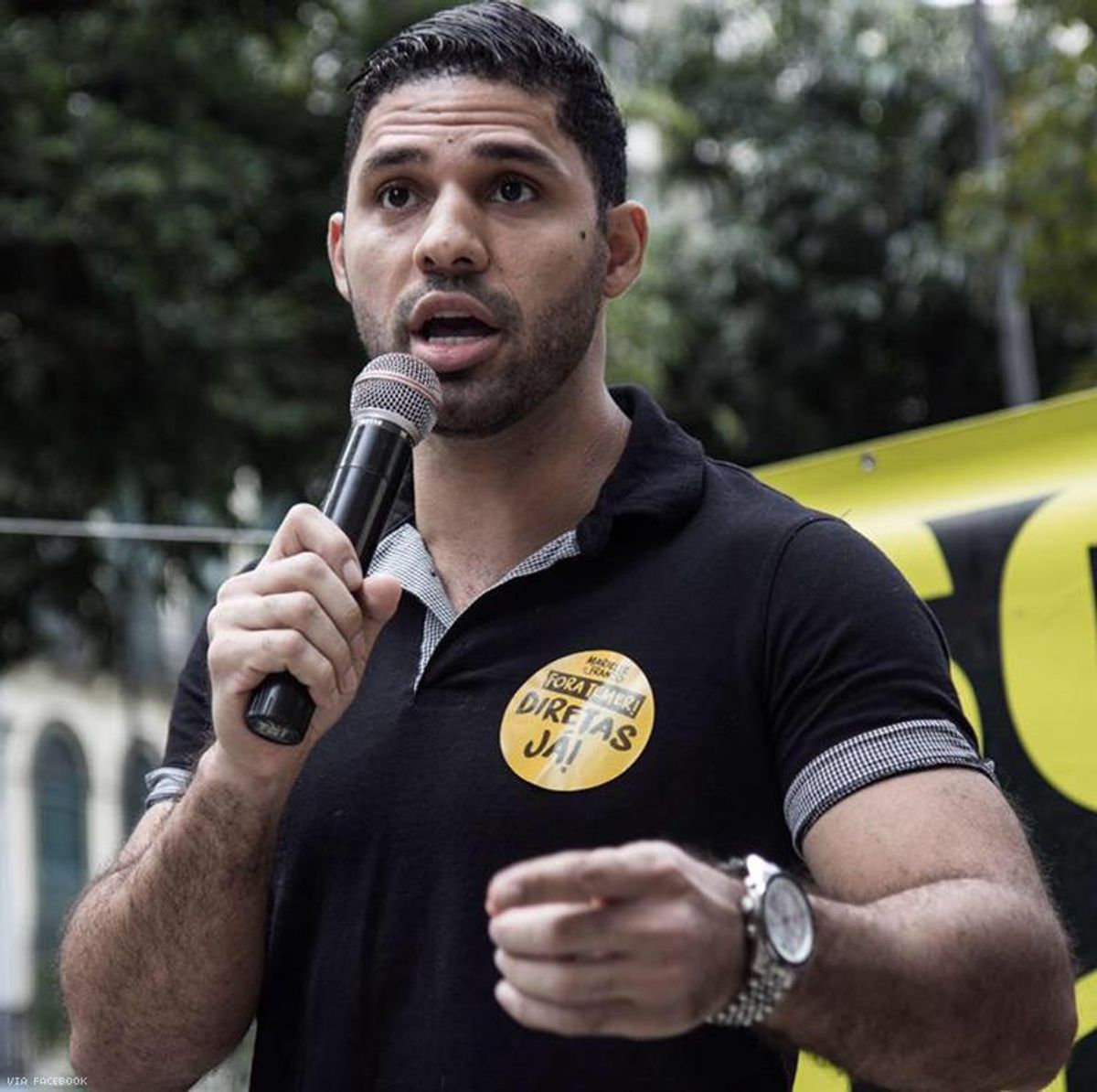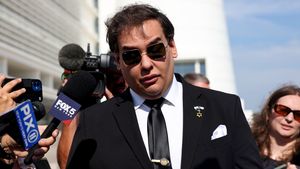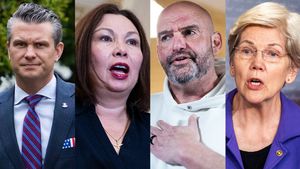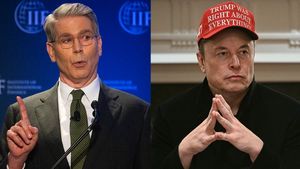David Michael dos Santos Miranda arrives at his house in a leafy section of Rio de Janeiro 20 minutes late, apologizing as he jumps out of the back seat of a bulletproof sedan. He has been watching Joao --one of the boys he adopted with his husband, Glenn Greenwald, last year --play soccer. The family rented the bulletproof car because Miranda is an openly gay city council member and a vehement critic of the city's right-wing mayor, Marcello Crivella. In March, Rio's other openly gay city council member, Marielle Franco, was shot dead by a trained assassin.
"There's a suspicion it came from inside the council," Miranda says of the order to kill Marielle. (The crime is still being investigated.) "They could have pretended it was a mugging," he adds, "but they didn't bother. They wanted to send a message." The assassination set off shock waves in Rio and beyond -- nowhere more so than in the house Miranda shares with Greenwald, their sons, Joao, 10, and Jonathan, 8, and the family's 24 dogs, all rescued.
Related | Glenn Greenwald's Husband Elected to Rio City Council
Now Greenwald, 51, and Miranda, 33, who met on an Ipanema beach 13 years ago, don't go out without "Justice for Marielle" stickers pasted over their hearts. And sometimes they don't go out at all. On May Day, Miranda decided to skip a rally in Rio's Campo Grande neighborhood because, as he texted this reporter, it "is too dangerous for me." But he isn't exactly hiding. That night, he announced on Facebook that he will run for Brazil's Congress on the ticket of the Socialist Liberation Party (Partido Socialista Liberdade or PSOL).
Anticipating the October election, he wrote, "Fighting for justice is necessary, an obligation -- even if it is always risky and dangerous to confront corrupt and powerful factions."
"There's a lot of fights I can have in Brasilia," says Miranda, optimistically. He names the passage of LGBT-specific hate crime laws as one of his goals. But holding national office could also make him more of a target for right-wing extremists. He used to worry about his husband's safety (working with Edward Snowden, Miranda says, put Greenwald on "a collision course with the interests of the world's greatest power"); now Greenwald worries about his. "Our lives are intense in every aspect," Miranda concedes as the dogs bark and the children clamor for his time. Whether being married to a world-famous journalist protects him remains to be seen.
Miranda, who has a degree in advertising and communications, says he is a full partner in Greenwald's award-winning journalism. ("Can you believe that bitch got the Pulitzer?" he jokes.) As we talk, at a dining table in the cavernous living room of the house they have been renting since last year, Greenwald walks in holding a laptop, a grin on his face, excited to show Miranda a phone bill he just received. I'm mystified -- Greenwald, whose yearly salary from the Intercept was reported in New York Magazine as $500,000, and who earns money from books, films, and speaking engagements, probably hasn't looked at a phone bill in 30 years. Then Greenwald explains: He was showing Miranda the phone bill of a prominent right-wing politician, one of several that had just arrived by email -- from an anonymous leaker. Greenwald and Miranda have a detailed discussion about what the phone bills - a classic example of metadata -- could reveal, and how employees of the Intercept might begin teasing out useful information. (The site online publication, backed by billionaire Pierre Omidyar, has employees in Rio, New York, and Washington.) On a Saturday night in Rio, any other gay couple might be making plans to go out clubbing; Miranda and Greenwald are talking about using journalism as a club. "His career and my career are the same," Miranda asserts. "We do everything together."

Photo Courtesy of Fred A. Bernstein. "Miranda and Greenwald at home in Rio in April."
The last time I wrote about Miranda, he was 26 and appeared mainly to be Greenwald's helpmeet. But now Miranda figures he's stopped on the streets of Rio more often than Greenwald. An elected official with a staff of 22, who has introduced several bills that became law, he is often on the TV news. One of his laws makes it possible for transgender people to use their preferred names on government documents. Fighting for the LGBT community, he says, "is the core of my bones and blood."
He says his childhood in a favela has made him somewhat fatalistic. Lots of friends, he says, "died in the infinite war against drugs that wasn't about drugs at all. It was about controlling territory." Orphaned young and raised by relatives, the self-described "black sheep of the family" left home at 13. As a teenager, he often lived on the streets and ate from dumpsters. He was 19 when he met Greenwald, a disenchanted New York lawyer who was vacationing in Rio. Within a week they had moved in together. Miranda started learning English -- he speaks fluently now -- and at 24 began attending college; he graduated in 2013. During those years, he was overshadowed by Greenwald. "People sometimes cried when they stopped him on the street," says Miranda, "I found it hard to process that. He was my husband."
But the cult of Greenwald only intensified after the journalist was contacted by Edward Snowden, setting off a chain of events that turned Greenwald into a global celebrity (Zachary Quinto played him in the movie Snowden). The Snowden affair threatened to ensnare Miranda, but it also brought him fame. On August 18, 2014, passing through London's Heathrow Airport with a thumb drive, he was detained under Section 7 of Britain's Terrorism Act 2000 and held for nine hours. He says, "I was sure I was going away to Guantanamo forever." He later saw the British High Court rule partially in his favor."They got fucked in the ass," he says of the agency that detained him -- a strange choice of words for a gay man to use to describe a comeuppance.
In 2016, he ran successfully for City Council (30 years after Greenwald ran unsuccessfully for city council in his hometown in Florida), winning the support of the poor. Diego Candido, a politically active lawyer in Rio, says: "With great charisma and also the attention of the media since the incident in London, David had a platform to talk about the needs of underserved communities."
When Marielle joined Miranda on the 51-member council in 2017, their friendship blossomed. Marielle was "a mother figure" for Miranda, whose real mother died when he was five. On his phone he finds a picture of himself carrying Marielle's coffin. "That might have been the hardest moment of my life," he says.
One of the ways he says he is honoring Marielle is by running for higher office. Being in Congress would require Miranda to spend about half his time in Brasilia. Of the children, he says, "I don't think it's going to be a huge problem. But we don't know how they're going to react."
Another way he is honoring Marielle is by celebrating his own identity. That includes letting his hair assume its naturally curly state. "I'd been straightening it my whole life," says Miranda. "I could show you all the products." His new coif, he says, "is a sign that I'm proud to be black." He has also grown a beard, which, he said, is a sign that "I want to annoy Glenn, who hates it."
"There will be more hard moments," says Miranda, during a tour of the house. Showing off the couple's meditation room he says, "I need to use it more."
"Fear is something I'm going to be feeling," Miranda says. "But I take precautions and go forward doing what needs to be done. Otherwise they'll accomplish what they want to accomplish, which is to silence every one of us."


























































































